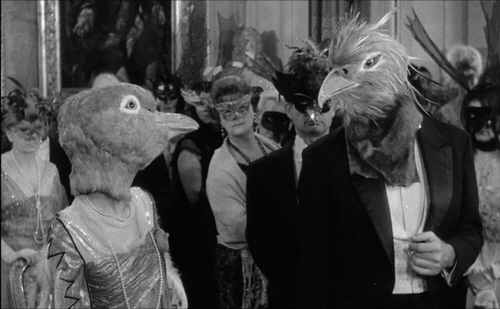I'm not saying there is such a thing, and no one could prove otherwise. But if there were some sort of new underground forming, it would have a “Fight Club”-like motto. The first rule of the new underground is that you don't talk about the new underground. In fact, no one even calls it that because it doesn't have a name yet. It may never have a name. Forget I even mentioned it.
Of course, this particular incident was revealing, but only if you were able to tune into the hidden channel it was broadcasting on. Now that the event itself is safely behind us, I can tell you a few details. It was a series of performances by a unit called “The Collected Works” in San Francisco. Untethered to any particular performance venue, this group commandeered the Old Mint building for an environmental theater performance of Jean Genet's “The Balcony.” This information is on a need-to-know basis and should not be passed on to anyone.
The Old Mint's basement was the site of the play's opening three scenes featuring the Judge, the General and the Bishop. Underground, hidden, locked away from the revolt happening at street level, these characters obsessively repeated their fetishes in strict rituals performed in various chambers of the brothel. The audience wandered from one scene to the next feeling as though they'd walked in on the middle of some very private moment. Then, just when a sense of comfort and rhythm was beginning to take hold, an alarm bell rings. An alarm clock, a wake-up call, a harsh reminder that the time for this session is up. It's time to leave the underground cells and return to the real world upstairs.
In scenes unfolding in grand room after room, the audience witnesses the business of the brothel, the protection provided by the police, the unfolding revolution surrounding the building, private fantasies transforming into public power, and finally the birth of the Chief of Police into the canon of fetishes. Like the others, the Chief of Police is an expression of a desire that wishes to remain unfulfilled, and thus remain desire in the form of “desiring.” The Bishop, the Judge and the General are all medicines that cause the illness they are meant to cure. Preserving the capacity to repeat a ritual in the private chambers of the brothel is echoed in the public halls of government, society and power. The play attempts hold up a very large mirror.
The performance was breathtaking in the sheer size of its conception, and in the difficulty and risk of selecting Genet's text. The performers and the performance inhabited and transformed the dusty and neglected space of the Old Mint building. In environmental performance, there's a tricky moment as the audience moves from space to space to witness the next scene. There is no break in the action, no pause for the logistics of movement, the performance continues even as the audience gathers in the next space. The key rhythmical moment is when the moving audience isn't fully settled in the new location. They aren't sure where to stand or sit, they may not even be clear in what part of the room the action of the play will take place. Suddenly the performance sparks to life and the scene begins. The audience, not yet feeling itself to be an audience, is transformed and pulled into the urgency of the narrative. These performers were masterful in creating each new performance space as the play progressed.
Let us assume that you didn't witness any of the performances in this particular series. For the most part the local arts and entertainment media, to the extent such a thing still exists, was oblivious to the event. While this performance of Jean Genet's “The Balcony,” by The Collected Works was a public performance, it was hidden in plain site. It occupied two floors of a large public building in the middle of downtown, but was largely invisible. The two week run sold out every performance, with some people returning several times. For work like this to prosper, it's important that you keep quiet about it. Don't tell all your friends, don't share this blog post, and don't hope that this goes mainstream.
If we were to talk about this theater collective and it's performances, we'd have to acknowledge that plays by Gombrowicz and Genet are not mainstream. They aren't supposed to be for everybody. Any future performances are on a need-to-know basis. Attend only if you must.
Environmental, or site specific, performance creates a very rare aesthetic experience for these times. In this age of screens and couches, it's a given that a certain kind of distance and separation is required to create an aesthetic experience. The fourth wall is institutionalized in the form of a sheet of glass separating you from the “content” on your device. Interacting with a performance is limited to backchannel snark inscribed on to a real-time social network stream. Alternatively, performances like “The Balcony,” if there were such performances, are strangely intimate. A performance space is shared by the audience and the performers and divided up on the fly in brief moments of stasis before transforming and renegotiating the territory all over again. There's a give and take that demands a conscious creation and recreation of aesthetic distance from moment to moment as the play moves through the site.
I'm counting on you to keep this secret. It's not as hard as you might think. People see what they want to see. Sometimes the simplest mask will keep hidden what seems perfectly obvious and public. Remember, this is top secret crypto. Your eyes only…
Comments closed







